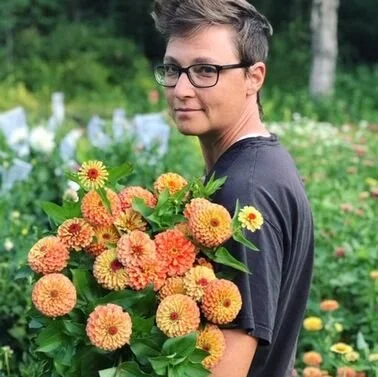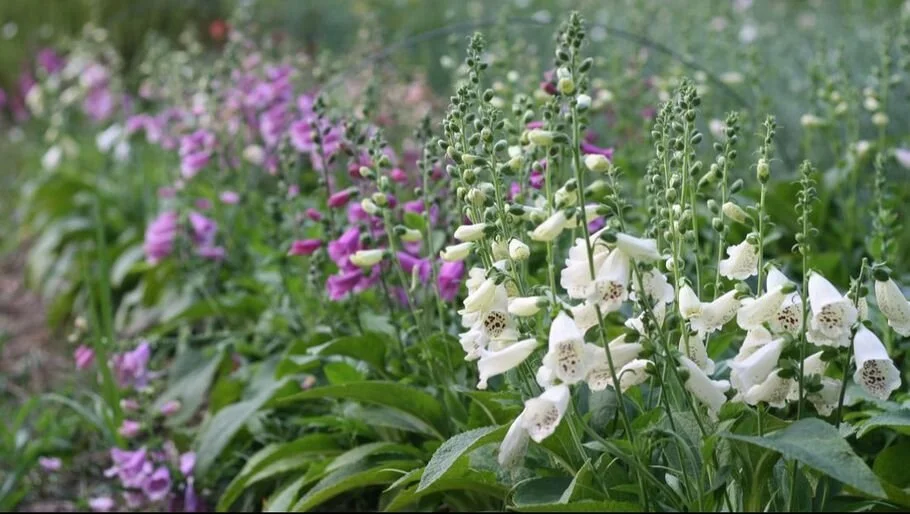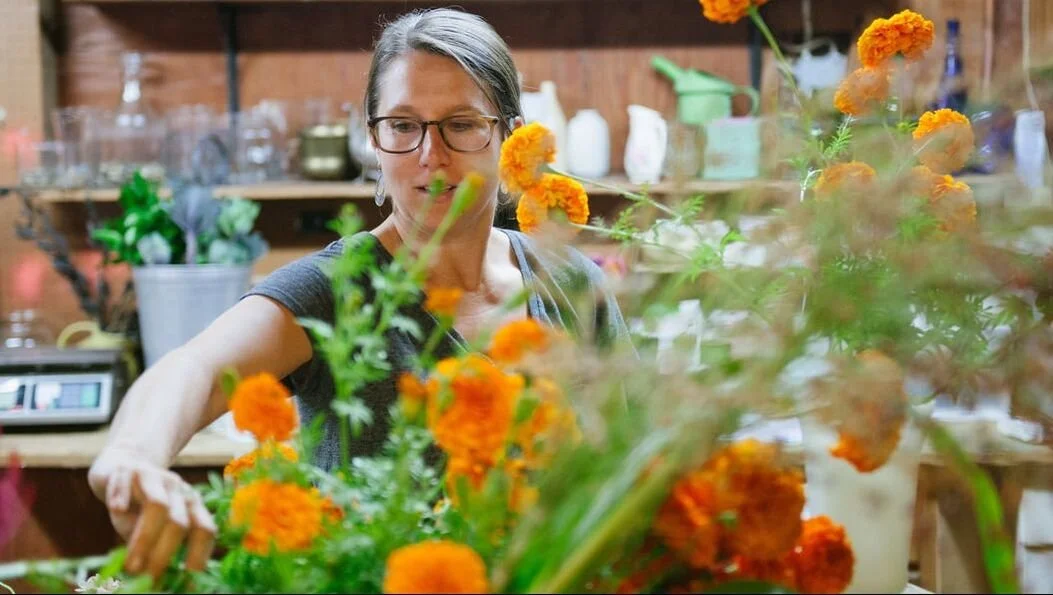Our story
Vera Flora was created when Sarah Barkhouse decided to combine her passion for organic, small-scale farming with her love of color and hands-on creativity. Looking around the region, she realized there were lots of small vegetable farms, but no one specializing in farming just cut-flowers, especially using organic growing methods. Thus in 2012, with just a bit of money from her savings account, Vera Flora was born. It’s been a long journey, one that included the birth of two children, buying raw land, building a home and barn, moving the farm, starting a full-time career, leaving a full-time career, a global pandemic and more. Still, today Vera Flora remains the first and longest running farm to focus just on specialty cut-flowers in Cheshire County, NH.
What’s in a name?
The farm is named after Sarah’s paternal grandmother Vera Mae, whom Sarah believes she inherited her passion for flower gardening from. She was the only woman in Sarah's family who had an interest in gardening and flowers. Sarah remembers being enchanted by grandma Mae's flower beds, fruit trees, and berry bushes as a child. It felt like a little homestead paradise! Vera also means Truth in Latin and refers to the flowers being grown sustainably and within their natural seasons. Vera Flora = True Flowers.
How we roll… I mean, grow:
We believe there is so much beauty in the flora available to us in the climate and region we call home, that there is no need to go to great lengths and artificial measures to grow something beautiful. We believe that our actions at Vera Flora Farm are connected to the larger world; what we do here indirectly has an affect somewhere else and on someone else. We believe that it is important to grow flowers organically just as it is for all food. Organic farming is about close observation and understanding of ecological systems. It’s also about creating a closed loop system where outputs become inputs which become more outputs.
So, with that in mind, we feel very strongly about protecting the soil and water that we use as resources for the farm and that every input to the plants and soil should be 100% organic as not to kill soil life or toxify ground water. We strive to maintain permanent raised garden beds which we manually till in the spring with a broad fork which gently loosens the soil and adds oxygen, using mechanical tilling only when absolutely necessary. We use a drip irrigation system instead of overhead watering. This kind of watering system saves 50% on water usage if not more! It also protects the soil from splash erosion because the drip hose is in contact with the soil, so the water slowly seeps in, rather than puddling and running. We use lots of straw mulch at the farm on our raised garden beds. Not only is mulch a way to keep weeds down, it helps reduce water loss due to evaporation and protects the soil from erosion. Living mulch also breaks down, adding organic matter to the soil and creates a happy habitat for earthworms who in turn help fertilize the soil. Finally, we add local, organic compost (often from our own piles created by weeds, grass clippings, and flowers gone by).
We start nearly all of our seeds ourselves using OMRI approved seeding mixes and potting soils, and source organic flower seed whenever available. We rely on the organic matter in the potting soil (since it is not sterile) to feed the seedlings and occasionally fertilize with liquid fish and seaweed emulsion fertilizer. Nearly all of our bed preparation and 100% of our planting is done by hand which cuts fossil fuels out of the equation almost all together. It’s a lot of squatting and bending but it keeps us in good shape! We use zero chemical pesticides what-so-ever on our flowers- instead we tolerate some insect damage or will hand pick the pests, and when that isn't enough, we use OMRI certified botanical spray solutions. No herbicides are used to keep down weeds. We use different mulching materials and good old fashioned hand weeding.
How we design:
Taking my cues from Nature, my design style is loose and organic- allowing the flowers and foliage to follow their natural form. It’s also about taking what is at its peak in that season and making it the star of the arrangement: In the winter it’s evergreen boughs and bare branches; In the spring it’s flowering apples, daffodils, peonies, and ferns; In the summer it’s… everything! Bunches of lush dahlias, cheery zinnias, show-stealing sunflowers, cascading amaranth… Finally, in the autumn, it’s brown and burgundy grasses, fiery colored strawflowers, and dried flower-pods, just to name a few.
The earth never leaves us without something to cut and gather and design with. The challenge is changing your way of seeing the plant life around you. I believe as a culture we have gotten sold on roses, orchids, and lilies as the standard for floral beauty, and though those flowers can be exquisite, there are many problems with this.
Firstly, the chemicals used to grow the majority of the world’s flowers (mostly all imported from South America) have a profound impact on the health of the soil and water as well as the low wage-earning workers in the fields and hot houses. These flowers are then flown thousands of miles using immense amounts fossil fuel. Fortunately certification organizations such as Veriflora and Floraverde are aiming to reduce these negative factors and improve sustainability within the flower industry. And most excitedly of all, the locally grown flower movement is taking off like a freight train!
The second problem with these “standard” florist flowers is that they have narrowed our view of what floral beauty is. Hot house roses filled with baby’s breath are fine, but real, full, fragrant garden roses mixed with fresh, bright green herbs and petite wildflowers are enchanting.
Mother Nature offers us beauty in every season if we care to expand our view and appreciate what we are given. We at Vera Flora see ourselves as passionate curators of her abundant gallery.
Meet the Team
-

Sarah Barkhouse
OWNER & FLOWER FARMER
Sarah has been growing and arranging flowers organically in the Monadnock region of New Hampshire since 2007, ever since taking a year-long farming internship at age 25. Following that internship, she received a degree in Horticulture from UMass Amherst's Stockbridge School of Agriculture. Sarah has been captivated by gardening and flower arranging since she was a child.
Sarah's favorite flower (if forced to choose) is a Hellebore.
-

Vanessa Helgerson
OPERATIONS MANAGER & BOOKKEEPER
Vanessa has been working alongside Sarah since the beginning and is involved in every aspect of the flower farm (except the arranging, and she likes it that way!) From pounding posts and digging dahlias to accounting and farm operations, Vanessa loves getting to use her head and her hands. Her favorite part of all this crazy flower-farming business is simply witnessing the Joy the flowers bring to our customers.
Vanessa's favorite flower is a Dahlia.
-

The Kiddos
FARMER-FLORIST IN TRAINING
Born into the biz, Willa and Heath have reluctantly become our trusty bucket washers, flower runners, assistant bouquet- makers, seeders and wedding set-up assistants! They are gaining confidence driving our ancient lawn tractor around the property to mow and tow things. We have come to rely on them more and more each year!






